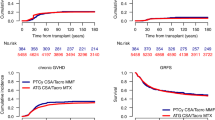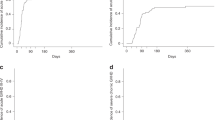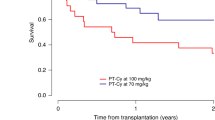Abstract
TNF-α (Tumor necrosis factor-alpha) is involved in many immunological and inflammatory processes, and might be expected to play an important role in the development of BMT-related complications. Triple therapy (pentoxifylline, ciprofloxacin and prednisone) with known anti-TNF activity was tested in 37 patients undergoing a hematopoietic progenitor transplant (HPT). A control group of 16 patients with similar characteristics was selected among consecutive patients receiving a HTP in a neighboring center who did not receive anti-TNF prophylaxis. Major transplant-related complications were registered (VOD, acute GVHD, infectious episodes, renal failure and mucositis) and survival status. TNF plasma concentrations were determined by ELISA, and pentoxifylline plasma concentrations were determined by HPLC. Among patients treated with pentoxifylline (PTX), ciprofloxacin and steroids, no difference in the mean survival time was observed compared with the control group. The incidence of procedure-related death up to day +35 was 11% in the study group and 6% in the control group. In spite of a tendency to a lower incidence of mucositis there was a higher incidence of infections (positive blood cultures) in the study group (49%) than in the control group (16.7%) (P = 0.16). This difference achieved statistical significance in patients receiving an allogeneic HPT (P = 0.05). It is likely that the use of steroids in the early period after transplant increases infectious episodes and makes control of GVHD difficult. The combined administration of steroids with pentoxifylline and ciprofloxacin has not proved beneficial in preventing mucositis, renal failure, VOD or GVHD, or in improving patient survival.
This is a preview of subscription content, access via your institution
Access options
Subscribe to this journal
Receive 12 print issues and online access
$259.00 per year
only $21.58 per issue
Buy this article
- Purchase on Springer Link
- Instant access to full article PDF
Prices may be subject to local taxes which are calculated during checkout
Similar content being viewed by others
Author information
Authors and Affiliations
Rights and permissions
About this article
Cite this article
Ferrà, C., de Sanjosé, S., Lastra, C. et al. Pentoxifylline, ciprofloxacin and prednisone failed to prevent transplant-related toxicities in bone marrow transplant recipients and were associated with an increased incidence of infectious complications. Bone Marrow Transplant 20, 1075–1080 (1997). https://doi.org/10.1038/sj.bmt.1701023
Received:
Accepted:
Issue Date:
DOI: https://doi.org/10.1038/sj.bmt.1701023
Keywords
This article is cited by
-
Systematic review of miscellaneous agents for the management of oral mucositis in cancer patients
Supportive Care in Cancer (2013)
-
Role of cytokines (TNF-α, IL-1β and KC) in the pathogenesis of CPT-11-induced intestinal mucositis in mice: effect of pentoxifylline and thalidomide
Cancer Chemotherapy and Pharmacology (2008)
-
Apoptotic and inflammation markers in oral mucositis in head and neck cancer patients receiving radiotherapy: preliminary report
Supportive Care in Cancer (2008)
-
Avoiding hepatic veno-occlusive disease: what do we know and where are we going?
Bone Marrow Transplantation (2001)
-
Allogeneic bone marrow transplantation in children failing prior autologous bone marrow transplantation
Bone Marrow Transplantation (2001)



